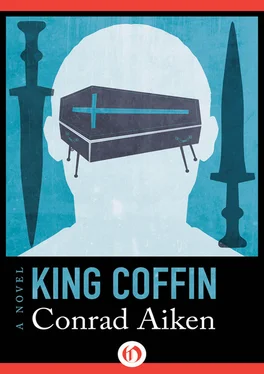He teased a cigarette from the opened packet on the red table, lit it, walked to the window. The smoke drifted backwards over his shoulder in a wide flat band of gray, undulated a little towards the floor, then softly dispersed in an upward vagueness towards the ceiling by the bathroom door. He watched it, saw the last pale thread of smoke lick neatly over the top of the door, and suddenly remembered that long ago he had meant to make a study of drafts in this fashion. “The flight of cigarette smoke is only a draft made manifest.” He said this aloud, as he crossed the room to open the door to the corridor, he said it with amusement, and then added:
— There goes the professor’s clock.
The clock had struck the half hour. Standing just outside the corridor door he blew upward a long soft plume of smoke, blew it towards the top of the doorjamb, but not forcibly: with the effect, therefore, of merely releasing, for observation, a trial balloon of smoke, a willing cloud. After a barely perceptible pause, the smoke billowed downward very slightly and then swooped in a long wide dispersed wave upward into the room. Keeping quite still, lest his own movement create any artificial current of air, he repeated the action: again the smoke swirled neatly, after a moment’s hesitation, into the quiet room — obviously the air in the corridor was warmer than the air inside. This being the case, the current near the floor must, of course, flow the other way. Stooping close to the linoleum floor he exhaled a soft cloud before him. It wavered, broke, and came loosely backward across and round his face. Exactly as one would expect.
The same thing would probably be true of the doors to the bedroom and the kitchenette?…
The bedroom worked beautifully — the draft was sharper, more dramatic, the smoke was as if violently seized, hurled headlong down invisible rapids. But the kitchenette, presumably because its window was shut, or simply because it was out of the path of the main currents, was a disappointment: the movement of the smoke, whether at floor or ceiling, was scarcely perceptible, sluggish, equivocal. In fact, it would go exactly where propelled. He blew cloud after cloud into the little boxlike room, it hung swaying and gently convolving over the table, over the white enameled refrigerator, over the gas stove, almost motionless, passive. It was like a backwater of a river: it was stagnant; and looking at it he became abruptly aware of the profound nocturnal silence. It was that moment between night and morning when the traffic is stillest, the brief interval between the end of the night life and the beginning of the day — the hour when life is at its ebb. In hospitals, people were now in the act of dying. And in Reservoir Street, at this instant—
He turned quickly away, walked to the corridor and closed the door. Returning, he stared out at the palely brightening clouds, heard again that grazing patter of the drizzle on the pane, saw the little chain of fine bright beads which had been lightly etched there. But the rain could make no difference — it neither added to nor subtracted from the wide appearance and nature of things. The structure beneath it was exactly the same, — undiminished, loyal, unsentimental: what one had made, or what one was making, was still the same, kept its hard and clear identity. And the whole face of the world, if one now dared to see it thus, was one enormous growing “ thing ”—a vast and dreadful or beautiful flower: a flower which, if beautiful, was also terrible: as if the universe might be simply a single outrageous pond-lily whose roots were murderous. Yes, it was exactly that. The blood drawn up by that profound taproot made possible the thrust and loveliness of the blind enormous flower: the perfect synthesis of good and evil. And if this was so, if life was in essence really like this, why then was it possible to feel any compunctions? Unless, of course, one simply failed outright in one’s attempt to identify oneself at all points with life: failed, at it were, to stretch oneself co-terminally with the four points of the cross, and to become, oneself, cruciform.…
The idea was not new, he had thought of it in fact at the very beginning, though not perhaps in quite such terms or so neatly. The structure of evil had been manifest and omnipresent, the evil in himself he had always quite recognized, or had at all events wanted to recognize: it needed no justification, was natural and right, and the whole action had in the end revolved quite properly around his decision to face the real shape of the world and to shape his own deed accordingly. But it seemed to him that he had never actually seen the vision, the tree-shaped vision, the lily-shaped vision, so clearly and perfectly as now. It was something of this that he had tried to put down in his rapid notes, the orderly sheets of which lay on the table beneath the map — but to look at them now was only to realize that vision is one thing, action or speech another. He said aloud, tearing the paper with deliberate hands:
— Many are the thyrsus-bearers, but few are the mystics. Few are the mystics! I must have a drink, and I must go slow.
But he made no move toward the kitchenette, where the whisky stood on the shelf, he stood still, aware that he was looking at nothing, he thought for a moment that perhaps the best thing would be to write, quite suddenly and quite simply —as if for the renewal of a lost contact with a swiftly sinking world — to Gerta. My dear Gerta, if it is not now, not already, too late — if now with the impediment in my speech removed —
Impossible.
It was not the conversation on the telephone with Jones which had done this — how could it be? It was not even clear that the conversation with Jones had anything to do with it. The logic of that, the logic of the consequences of that, was flawless: there had been no mistake: the whole thing now stood, from beginning to end, as perfect as a theorem in algebra. Jones, Karl Jones, would meet him on Friday, they would drive together to Concord — to meet the mythical partner and discuss the mythical advertising campaign — Jones had assented to the plan almost with alacrity — and with this was concluded the final pure curve of the idea. The ultimate cutting-off had thus been accomplished, the separation from humanity; the individual had asserted himself, stood alone in the full horror of a light which permitted no moral shadows: or none, at any rate, save those created by his own will and for his own purpose. The stranger had been identified — hadn’t he? — as Jones, and as such could thus be destroyed: the strangeness in Jones had been recognized, with its terror and its pure desirability; it had been observed carefully and inimically as the thing-that-wants-to-be-killed; it could be killed. There is no compromise with the object, no placid or reasoned acceptance of it. It is seen, understood, and destroyed. The vision is pure.
Yes!
But suddenly he felt that he must close his eyes; and opening them again, he as suddenly felt, for no clear reason, that he must clap his hands sharply together before him, turn quickly, look at something else, something new —do something, go somewhere. He clapped his hands together again, walked toward the waterfall without seeing it, revolved quickly away from it, and made as he did so a gesture with his hands such as he knew (and painfully) he had never in his life made before : a queer forward thrust of the hands, stiffly parallel, the fingers tensely apart, as if he were in fact reaching for something. It lasted only a moment, his arms fell limply to his sides, limply and a little self-consciously, almost perhaps ashamedly. This wouldn’t do, this wasn’t right at all! Once more he began to feel as if he were in some subtle way being indecently hurried; like a person who in stepping on to an escalator miscalculates its speed. It was as if one were rather cruelly and undignifiedly yanked , dislocated — and with that feeling of disgust with oneself which makes one disinclined for the time being to look at oneself in a mirror. To lose control —
Читать дальше












